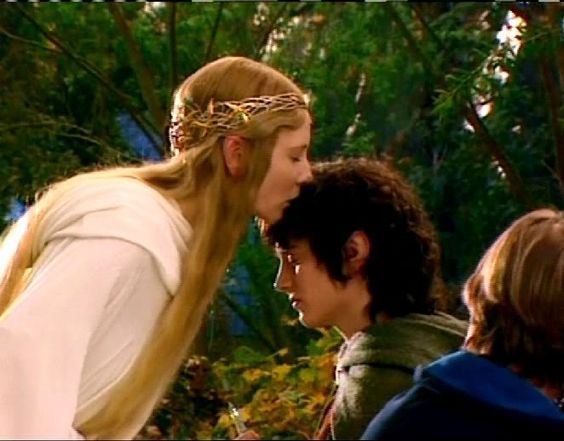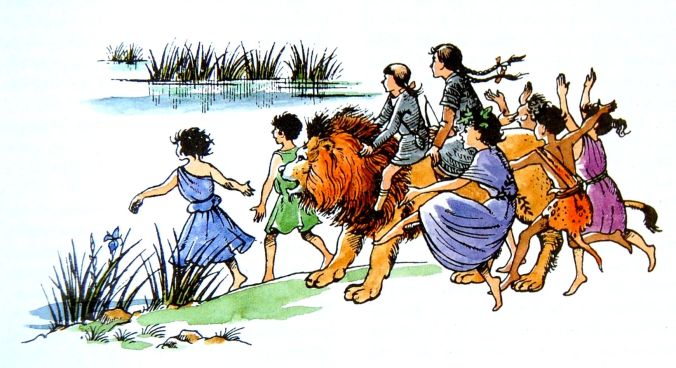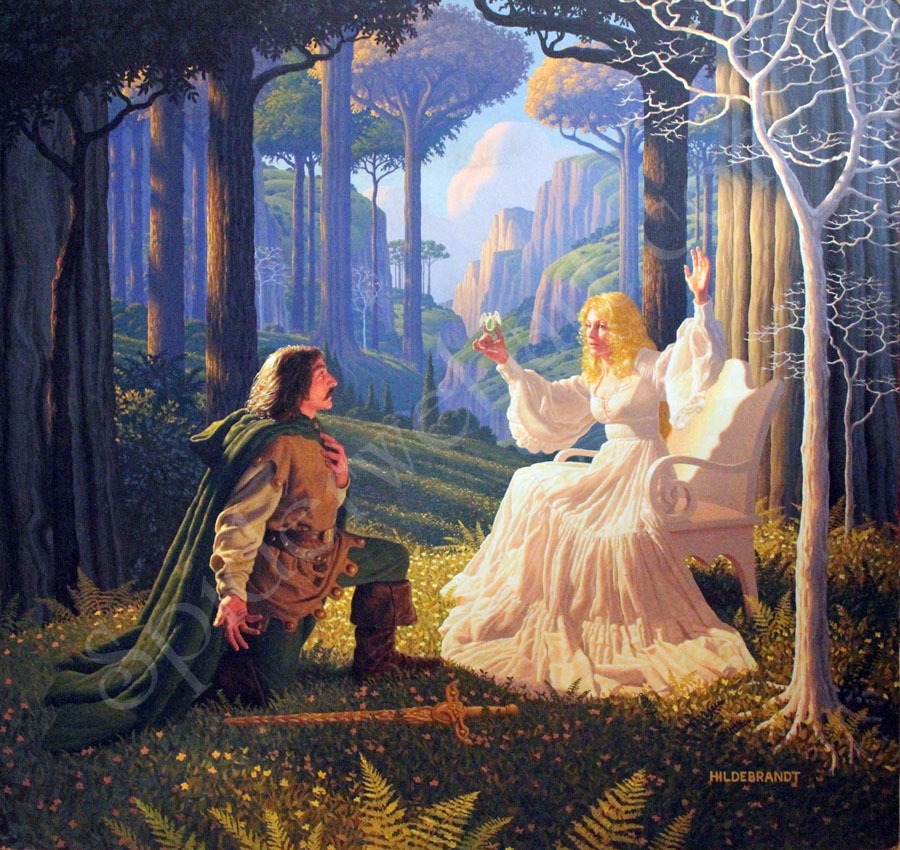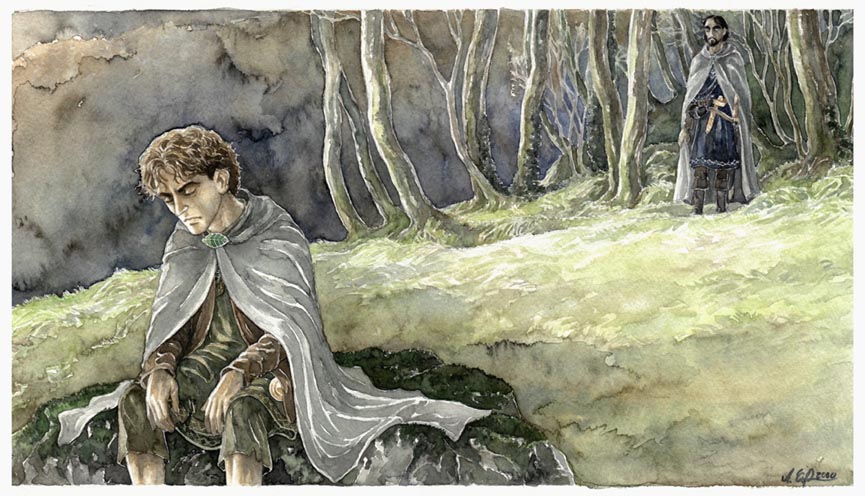The Two Towers by J.R.R Tolkien (Harper Collins 1991, 2007) pp. 874-878
The question of trust is one of life’s greatest challenges. When we are able to trust someone it creates a liberty that enlivens and energises like nothing else. When trust is betrayed the very foundations of the soul are undermined. In Dante’s Inferno it is traitors who are placed in the deepest circle of hell. Faramir himself has had to struggle with the question, “Can he trust Frodo?”. When he was interrogating Frodo after the battle against the Haradrim it was the one thing that he was striving to establish. Boromir was dead and here was someone who clearly had known him. Had Frodo played some part in his brother’s death?

“Treachery not the least.” Can Faramir trust Frodo? Anke Eissman depicts Faramir’s interrogation of Frodo.
One of the central themes of The Lord of the Rings is the creation of the bonds of fellowship. Fellowship is in the very title of the first volume of Tolkien’s great work, the one title in which he had full confidence, having wished himself that the book should have been published in a single volume and not three as his publisher decided to do. When Elrond formed the Fellowship following the Council in Rivendell and Frodo’s courageous offer to carry the Ring to the Fire of Orodruin in Mordor he had two purposes. One was the decision to choose nine walkers to stand in opposition to the Nazgûl, Sauron’s nine riders. This was a symbolic choice and not a practical one. Perhaps only Gandalf of the nine could match any of the Nazgûl in combat. That one of the hobbits should play a part in the death of their chief was due, not to his prowess in battle, but to the part played by deeper and providential forces at work, another of the central themes of Tolkien’s great work.

The Nine Walkers of the Free Peoples against Sauron’s Nine Riders. The team photo from Peter Jackson’s films.
The other purpose in Elrond’s choice, and the purpose that we are considering in this reflection, was to create a fellowship of the free peoples of Middle-earth; elves, men, dwarves and hobbits. That these had been sundered from one another over long years had been one of the greatest sorrows of its long history. There had been no alliance of men and elves since the end of the Second Age and the war against Sauron in which Elendil the only High King of both Gondor and Arnor, and Gil-galad, the last High King of the Elves in Middle-earth, were able, just, to stand against Sauron in battle and to overthrow him. Indeed it had been one of Sauron’s main purposes throughout the Third Age once he began to take shape again following his defeat and the loss of the Ring, was to weaken those essential bonds of fellowship among his enemies. Elves and Dwarves had long mistrust in one another as we learned when Gimli came to Lothlorian. Indeed it was one of the greatest fruits of the stay of the Fellowship in that land that Gimli gave his heart to Galadriel and formed a deep friendship with Legolas, the son of an elven king who had once held Gimli’s own father prisoner. Elves and Men had become sundered as the elves had slowly withdrawn into secret lands and a secret way of living, the outcome of which was that elves had become a thing of legend in the minds of men, even an uncanny thing, a thing to be feared little less than Mordor itself. And hobbits, if they were known at all, were largely disregarded as a people of small consequence.
Throughout the Third Age it was examples of friendship between its free peoples that was always remarkable. Elrond’s own “Last Homely House” in Rivendell was a place of hospitality to all free peoples, and its way, The Prancing Pony in Bree played a similar role but on a lesser scale. That Elves never made use of its welcome played its part in the growing belief amongst other peoples that they were fey and to be feared. The west door of Moria through which the Fellowship entered with such difficulty had a password of beguiling simplicity. All a traveller needed to do in order to gain access to the greatest kingdom of the Dwarves was to say the word, friend, and the door would open. And the friendship between Dale and the kingdom under the mountain, near neighbours in the north of Middle-earth, was a rare example of friendship between Dwarves and Men.
Indeed each of these examples brought prosperity and strength and it was to deepen, even create, friendship to which Gandalf devoted his long sojourn in Middle-earth, using Narya, the even ring of fire to “rekindle hearts in a world that grows chill. In our own human history it was the creation of Christian monasteries, first formed in the deserts of Egypt and Syria in the 4th century, and then in the West of Europe following the fall of the Roman Empire, places of hospitality, learning and healing, that played a central role in the renewing of Europe, giving a part to friendship in the history of that continent that stood in sharp distinction to the role of power in the Roman Empire and in the many attempts to recreate empire in the centuries since that time.
So can Frodo trust Faramir? Or is fear, even if undeserved, a wiser cause of action? Perhaps the whole future of Middle-earth rests upon the choice that Frodo will make. Fortunately for all it is Sam’s simplicity that will make the choice for all and that is wonderfully providential.

Can Frodo trust Faramir? He remembers the effect of the Ring upon Boromir. Anke Eissman depicts Boromir’s treachery when he tried to take the Ring from Frodo.






















